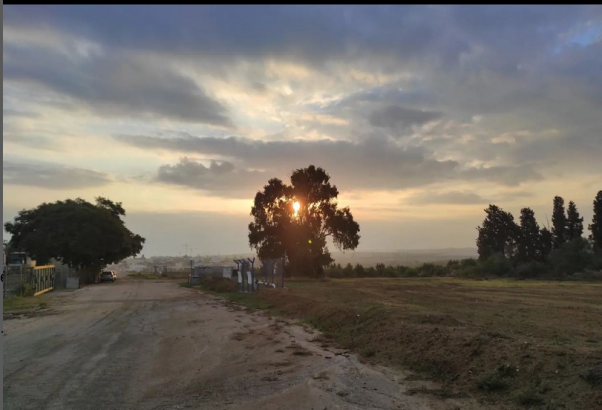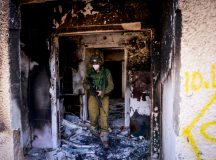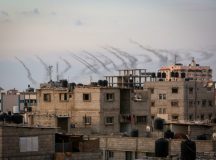A member of Kibbutz Nir Am near Gaza, and outgoing executive Director of the Hagar Association which operates the only Arab-Jewish, bilingual school in southern Israel, Sam Shube relates his thoughts and feelings on the future of Zionism following the murderous events of October 7.
No Monopoly on Barbarism
We buried our cousins in four freshly dug graves at Kibbutz Revivim, 40 miles as the crow flies from the killing fields of Kibbutz Beeri where they made their home. Chen, a burly farmer, the kind of guy you want in your corner; Rinat, a veteran social worker; 17 year old Alon and 14 year old Ido. Two smaller siblings survived when Rinat and Alon spread their bodies over the little ones in a protective embrace, like a warm blanket at bedtime, taking the bullets in a final act of love. Hundreds of people wept in silence, an extended family of farmers from agricultural communities across the Gaza envelope, many of them recently mobilized young men and women on “funeral” leave from their reserve units, rifles slung over their civilian clothing. Rinat had texted the family that dark October morning, as I huddled with my partner and nine-year-old son in our own safe room, just 10 miles north of Beeri. We were sure that Chen – veteran of an elite IDF reconnaissance unit – would get them out. Electricity and cell phone service were down all morning at our kibbutz as fighting raged on the perimeter fence. By the time we received her message, she was probably dead, as scores of heavily armed killers hunted for Jews — Gazan civilians in tow, rounding up livestock and home appliances like shoppers on black Friday. Did the Hamas warn them that their own homes would soon be reduced to rubble by the inevitable IDF response? For 21 hours I stood at the threshold of our safe room, listening for sounds of the battle raging at the edge of our own kibbutz, knowing that if they broke through, we’d be next. Only the resourcefulness and bravery of a handful of volunteers kept the killers at bay until we could evacuate. At Revivim, rows of fresh graves extended beyond the funeral site, waiting to receive another hundred members of Kibbutz Beeri. It was a scene to be repeated throughout the country for other communities who shared the same fate. At Kibbutz Nir Oz, a quarter of the population was murdered. A day before I had debated a friend about whether the massacre resembled the German Einzatzgruppn or 19th century Russian pogroms. Either way, I reflect, Islam has no monopoly on barbarism. And Israelis are not immune either.
The Jewish State or the Boer State
Siblings and schoolmates eulogized the Even-Segev family in a quiet ceremony, closed to the press, soft Hebrew music playing in the background. The grief was palpable, but the word “revenge” was not to be heard. No room in their hearts for gratuitous hatred or racism. Never was. These folk work with Bedouin farmers and colleagues on a daily basis, and many remember a time when personal and commercial interaction with the Gaza Strip was routine. Here in the Negev, civil society has a depth and breadth that crosses ethnic boundaries and ideological preconceptions. Not everywhere, though. Right wing groups have draped banners from overpasses around Israel demanding revenge, as if a dose of their sickening screed could reverberate through a society already numbed by atrocity.
They may be right. Just over the Green Line in the West Bank, nationalist fanatics are already creating their own, violent fantasy world. Since October 7th, at least seven Palestinian farmers have been shot dead by Israeli settlers. The occupation of this swath of territory was once justified by the need to secure a defensive line along the Jordan rift valley, a formidable geographic barrier against invasion from the east. No longer. Today the IDF is tasked with protecting the 460,000 Israeli settlers who live between the Jordan and Israel’s internationally recognized boundaries to the West under a separate and unequal legal regime designed to preserve and extend their hegemony; and controlling their 2.6 million Palestinian neighbors who subsist in a legal twilight zone, bereft of political rights, their civil liberties and freedom of movement curtailed and their land often confiscated for Israeli use. Former Mossad chief Tamir Pardo, has called this apartheid. Indeed, today’s West Bank might be properly described as a kind of Boer state, where armed colonists are the law and even the Israeli army treads lightly for fear of incurring settler wrath. Israel’s infantry provides the muscle that keeps armed Palestinian groups at bay. But security coordinators in the settlements – settlers who are deputized, armed and trained by the IDF – often call the shots on the ground. A pervasive atmosphere of lawlessness invites violence against Palestinians. Brutal and primitive in its tactics, it has included defacing mosques, burning fields, destroying olive groves and vandalizing property. In the Palestinian village of Hawara, perpetrators set 200 buildings and 30 cars ablaze earlier this year, killing one resident. Now, with the armed force of the IDF massed on Israel’s northern and southern borders, their wildest fantasies may seem within grasp. According to a report in Haaretz, entire Palestinian communities have fled their homes in response to settler intimidation.
Hamas or no Hamas, the Boer state is a dilemma of our own making. No Israeli government, save those of Yitzhak Rabin and Ariel Sharon, has had the courage – or the incentive – to defy settler political clout. This must change. Once this war is over and the IDF eradicates the Gazan terror regime, Israel must be asked to choose: advanced American weapons systems or housing developments on the West Bank. A year ago the government announced plans to spend NIS 700 million on settlements. That’s about the price of two F-15s. Israel needs robust US military aid to survive. But every home, industrial zone, municipal subsidy, road, streetlight, or sewage pipe for Israeli settlements in the West Bank should be deducted from that sum. Put these funds in an escrow account to help relocate settlers to new homes within the Green Line. Or use them to compensate Palestinians for loss of income due to restricted access to farmland.
Always a Reason to Kill Jews
Some folks insist on seeing Palestinian victimhood and Jewish malfeasance whenever innocents are killed, like some uncontrollable, Pavlovian response, no matter how Orwellian the logic. Thus on October 8th, with the killing still in progress, Mohammed R. Mhawish explained in 972 magazine that “for us [Palestinians]. . . It is the moment when we defend our very existence and right to live peacefully in freedom.” UN Secretary General Antonio Gutteres ruffled a few feathers when he proclaimed that the October 7th that the massacre “did not happen in a vacuum. The Palestinian people have been subject to 56 years of suffocating occupation.” Without justifying the murder spree itself, Gutteres seems to have identified its cause as the 1967 war. More often than not however, critics of Israel point to the blockade imposed on Gaza in 2007, after the Hamas took over the enclave, as the proximate source of violence. “The international community has for years neglected the plight of the 2.3 million Palestinians living under a 16-year-long Israeli siege,” explains the Arab Center in Washington, DC. Indeed, back in 2008, the Red Cross had already warned that 70% of Gaza’s population suffered from food insecurity and chronic malnutrition as a result of Israeli policy. Perhaps mass murder is a natural response from people who have been starving to death for 15 years, though one wonders if it is biologically possible to starve for so long while building an arsenal of tens of thousands of rockets, hundreds of miles of military tunnels, and highly trained death squads. Or perhaps one might ask why food was lacking, if it was lacking, with such plentiful military resources on hand. But the ultimate reason Hamas does its thing, according to some observers, is the Naqba, the displacement of 700,000 Palestinians by Israel in the war of 1948, ground zero – we are told – of the Arab Israeli conflict. Historian Ilan Pappe sums up the events of October 7th with the pithy insight that “[Israel’s] present genocidal policy towards Gaza are [sic] part of the ongoing Naqba.” 2007, 1967, 1948, take your pick. But don’t stop there. In 1929, long before the Naqba, Palestinian marauders killed 133 Jews in Hebron, Safed, Jaffa and Jerusalem, most of them ultra-orthodox, with no connection to the Zionist movement, many of them neighbors with whom they had lived for years. As Hillel Cohen painstakingly explains in his landmark study, Palestinians had come to see all Jews as representatives of the same Zionist enterprise. So it was and so it is. Any organized Jewish national presence in this land, apparently, is justification for “armed struggle.” Perhaps it is time someone reexamined the causal relationship between this culture of death and the Naqba, occupation and blockade that followed. Until that happens, all talk of a two-state solution is meaningless prattle.
When a Zionist Sees Palestine in the Mirror
Palestinian nationalism may be irredeemably poisoned by nihilism, but Palestinian identity itself defines the very humanity of millions of people, some two million of them Israeli citizens. If our democracy is to rise again after the war, we must learn to distinguish between the two and embrace the latter – nuanced as the idea may be. I have devoted my own career to building a more inclusive paradigm of shared culture for Jews and Arabs in the Negev. Below the surface, civil society may now be laying its foundation. In the midst of the crisis, dozens of grass roots initiatives are mobilizing Jews and Arabs for collective action to help everyone in need, from Jewish farmers in the Western Negev to the unrecognized Bedouin villages in the east. Some 16 Arab citizens have been killed by the Hamas and another 40 are missing or were kidnapped on October 7th. In this wartime emergency, even the most innocuous display of Palestinian colors can lead to arrest, termination at work or suspension from university. This will have to stop. In the end, Jews must be able to see in the pain, pride and determination of the Palestinians a reflection of our own. No, we cannot bridge the unfathomable political gulf that separates us. But a dose of mutual respect would serve us well.
Rethinking Ukraine
International support for Israel has been truly impressive. Biden, Macron, Scholz, Sunak, Ursula Von der Leyen – leaders from across the democratic world have rushed to embrace Netanyahu, a man whose signature contributions to Israeli diplomacy have been to drape Likud headquarters with a massive poster of Vladmir Putin, embrace Victor Orban and glorify Donald Trump. It must be humiliating for Bibi to bend the knee in gratitude to the liberal order he has done so much to disparage, but this is no mere personal matter. America’s massive resupply of military hardware – a replay of Nixon’s strategic airlift in 1973 — and the deployment of two carrier strike groups to protect Israel against a regional conflagration, should be a stark reminder to Israel’s political class as a whole that sometimes you have to choose sides. Bibi’s flirtation with Russia and the Visegrad bloc was, perhaps, the product of his own delusions of self importance, but Israel’s shameful failure to support Ukraine in its struggle to survive was an act of cowardice that crossed political lines. Biden’s Oval Office address linking aid to Ukraine and Israel was a formative statement, and something this country would do well to ponder. Israel turned a cold shoulder to Ukraine, it is widely assumed, for fear of provoking Russia to launch its S-300 antiaircraft rockets in Syria against Israeli jets, thereby limiting our ability to strike Iranian proxies in that country. Those rockets are a serious consideration, to be sure, but if Biden is willing to take political risks for Israel, we can show a little moral fiber as well. Russia has interests at stake in Syria too, and shooting at Israeli jets would put those at risk. In 1970 Soviet personnel manned Egyptian anti-aircraft batteries that fired on Israeli planes, and Israeli jets held dogfights with Russian pilots over the Suez Canal. Not a few Russian servicemen paid with their lives. When the present crisis is over, Israel will have to take a stand – for Ukraine, and for the democratic prospect writ large.
Going Home
No, I’m not a farmer. Everything I know about wheat comes from the back of a cereal box. For the past six years I’ve been at Kibbutz Nir Am, never of Nir Am. It was simply where I slept and parked my car before heading off to work in the morning. But something has broken in my own suburban, residential paradigm. The government says kibbutzim such as Nir Oz will take years to rebuild. Nir Am, we hope, will bounce back sooner. While my family is settling into its temporary refuge in Jerusalem, we are eager to get back to our community on the Gazan border fence, replant and rebuild. Rehabilitating the kibbutzim and the towns of the Gaza envelope, caring for the orphans and shattered families, reconstructing the homes, nurturing devastated communities back to emotional health, reintegrating our hostages when they come home, and weaving the multicultural fabric of life back together in the Negev will be the final challenge of my generation, and the first one for that of my son. We owe it to our country. We owe it to Chen, Rinat and their kids.




































